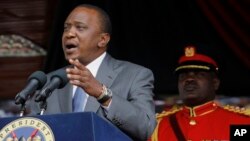Kenyan President Uhuru Kenyatta has marked two years in office as the country wrestles with terrorist attacks and endemic corruption. The anniversary comes a week after al-Shabab gunmen killed 148 people at Garissa University College.
The milestone for Kenyatta and his deputy, William Ruto, comes as Kenya mourns those murdered last week.
The government is still working on identifying the bodies of those killed, as reports emerge that more than 160 students remain missing.
As the president and his deputy begin their third year in office, there has been much of talk about insecurity and corruption cases linked to top government officials, including some ministers.
Questions of efficiency
Kenyatta has taken a strong stand against corruption, calling on all government officials and individuals involved in the alleged graft to step aside while investigations take place. So far, four ministers have done so.
Barrack Muluka, a political commentator, said the two leaders will find it hard to celebrate after what happened at the university.
“Anniversaries are made to be celebratory occasions when you come out with what we may want to call your brag sheet, your score card, and you don’t just talk about it, you also mark it a bit of oomph and razzmatazz, which unfortunately they can’t do because of this seasonal mourning," said Muluka.
"And it’s a seasonal mourning, which also exposes their soft underbelly with regard to insecurity,” he said.
Kenyan government spokesman Manoah Esipisu said the criticism is unfair. He has called for Kenyans to change their way of thinking when it comes to terror attacks.
"Oh! All this was in vain, somehow people didn't care about the welfare, Jesus! Our nation is at war, it's a fact that we have to live with; this country is at war," said Esipisu.
"When you are at war, the same rules don't apply and if we are at war we need our mentality to be different than it is; it's not always about us, you got to factor in your enemy. You've got to factor in your enemy if in fact your enemy walks by you," he said.
Human rights issues
Despite security lapses, Kenyan authorities say they are doing everything possible to protect citizens from Somali militant group al-Shabab, which claimed responsibility for the university attack.
On Wednesday, authorities froze banks accounts of financial institutions, rights groups and individuals suspected of having supported the activities of al-Shabab.
Some of the institutions include 13 Somali money transfer companies whose licenses were canceled and bank accounts frozen.
In a statement, Human Rights Watch said the list raises more questions than answers. The statement goes on to say individuals and entities on the list, including licensed agencies providing essential funds, have a right to transparency and due process.
The New York-based rights group said measures taken against two human rights groups - Muslims for Human Rights [MUHURI] and Haki Africa, which have been documenting abuses by security forces - raise suspicion the government is fighting critical voices and those who question the tactics used to fight terrorism in the country.




